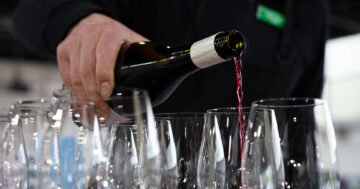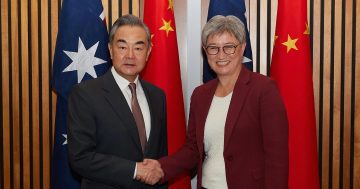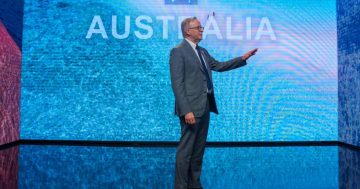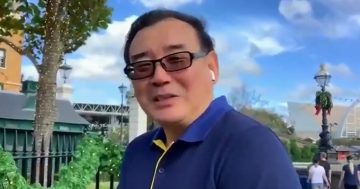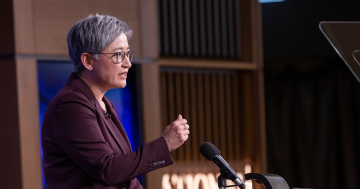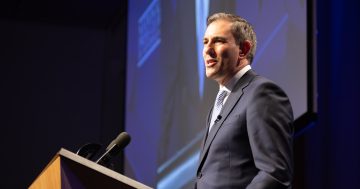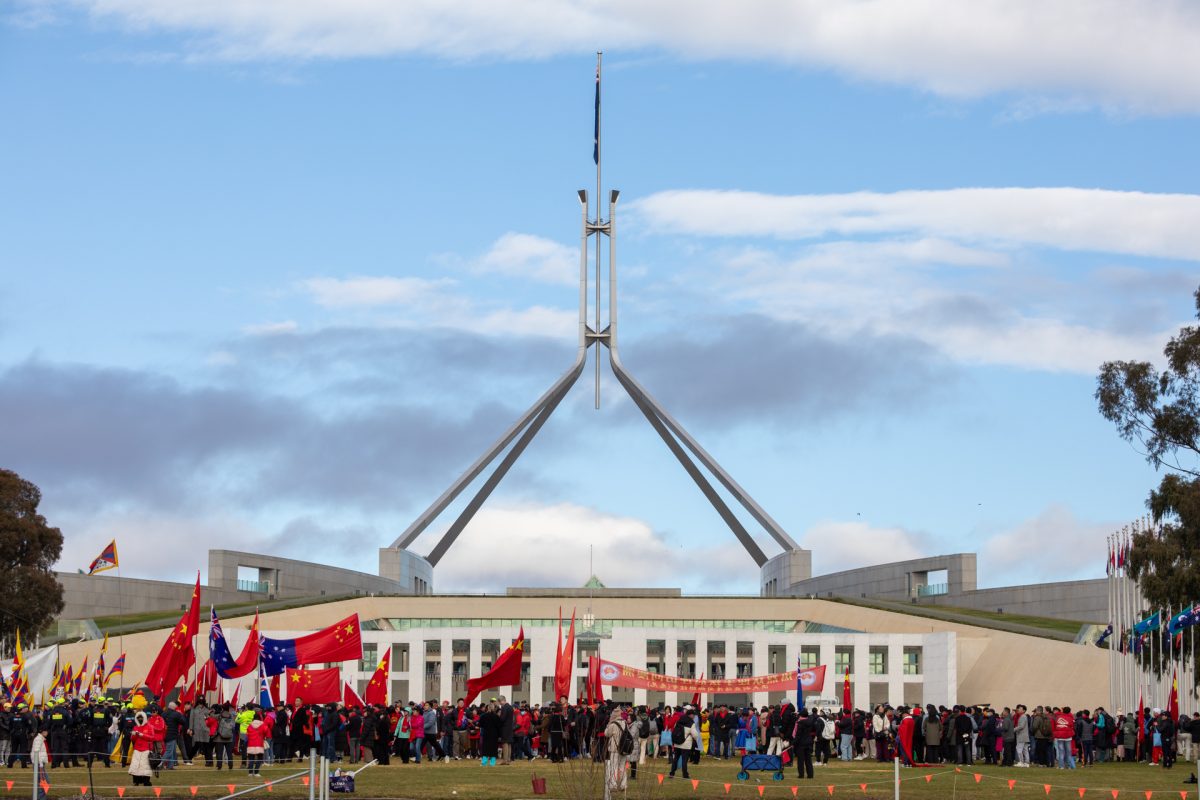
The Chinese community showed support for Premier Li’s official visit. Photo: Michelle Kroll.
Supporters of the Chinese Communist Party, as well as protestors against it, flocked to the streets around Parliament House on Monday (17 June) to make their presence known as Prime Minister Anthony Albanese hosted discussions with Chinese Premier Li Qiang.
Hundreds of Chinese flags were being waved by Chinese nationalists, outnumbered by protest banners from supporters of Tibet, Hong Kong, Taiwan, the Uyghurs, Falun Gong and human rights in general.
Human rights were also a feature of the official dialogue between the two leaders inside Parliament.
Mr Albanese warmly greeted the Chinese Premier but also raised topics of capital punishment, jailed Australian academic Yang Hengjun and others on death row in Beijing, regional security, Pacific unrest and freedom of speech.
“It is a relationship in which we must always be ready to engage with each other as mature nations,” the Prime Minister said at the official luncheon in the Great Hall.
“There is much that remains to be done, but it is clear that our nations are making progress in stabilising and rebuilding that crucial dialogue.
“We won’t always agree – and the points on which we disagree won’t simply disappear if we leave them in silence.
“We share an interest in protecting a stable order in our region. We share a responsibility to build and strengthen the foundation for talking through our differences and for building collaboration in areas where we do find mutual interest.
“Creating channels of dialogue and building understanding is how we make it possible for benefits to flow – across business, trade and education, climate and health, culture and the arts.”
Mr Li confirmed that China’s relationship with Australia was “back on track” following a tense time under the Coalition government of Scott Morrison.
He said that in less than one year, he had met with Mr Albanese “multiple times” and exchanged visits to each other’s country.
“This shows that both countries attach great importance to our relationship and that this relationship is on the right track of steady improvement and development,” the Premier said.
“Just now, Prime Minister Albanese and I had a candid, in-depth and fruitful meeting and reached a lot of consensus.
“We both agreed to uphold the right characterisation of our bilateral relationship and consolidate its momentum of improvement and development.
“We reaffirmed our commitment to defining this relationship as a Comprehensive Strategic Partnership, to mutual respect and trust, and to viewing and handling this relationship in a positive attitude.”
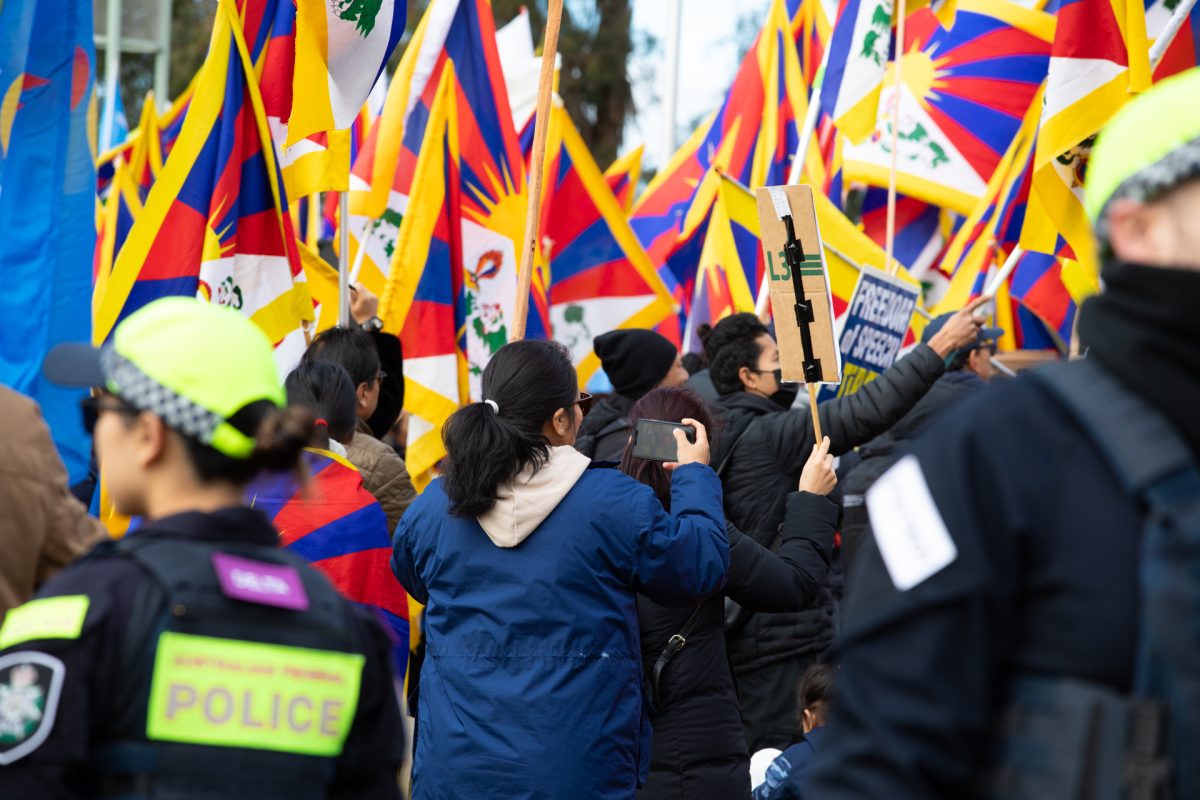
Protestors also showed their numbers during the Chinese Premier’s visit. Photo: Michelle Kroll.
Following their annual leaders’ meeting, the pair oversaw ministerial signatures on a range of bilateral arrangements to renew dialogue and strengthen cooperation between Australia and China.
Ministers signed a memorandum of understanding to strengthen the implementation of the China-Australia Free Trade Agreement, an MoU on advancing the Strategic Economic Dialogue, and an updated one to resume cooperation on climate change.
The leaders also oversaw an MoU on education and research cooperation, and strengthened collaboration between their nations’ respective arts and cultural sectors through the 15th Implementation Program under the 1981 Agreement on Cultural Cooperation.
That program will encourage visits and skills exchanges between creative and cultural professionals and institutions.
“I was pleased to host Premier Li today for the annual leaders’ meeting, which built on the progress made since my visit to China last November,” Mr Albanese said.
“The agreements reached today are a result of the government’s steady and deliberate approach to our relationship with China. They also reflect the broad range of areas where we can cooperate and work to mutual benefit.
“Bilateral trade has brought significant benefits to both our countries. China remains our largest trading partner, and trade supports one in four Australian jobs.
“Australia and China recognise the need to work together to tackle climate change — a global issue that requires a global response.”
Australian journalist Cheng Lei, released late last year after three years of detention in Beijing, was blocked by Chinese officials from viewing the signing ceremony at Parliament House, despite Australian officials repeatedly asking them to move.
Opposition Leader Peter Dutton addressed the Chinese Premier at the official luncheon, saying his visit gave him hope for the future.
“In our offer of hospitality today – and your acceptance of it – I believe that there is hope,” Mr Duttonn said.
“Hope that tensions of recent years can ameliorate. Hope that we can reinvigorate the constructive spirit which defined our signing of a Free Trade Agreement in 2015.
“Citizens across both of our countries share aspirations for peace and prosperity – for themselves and, of course, their families.
“In pursuit of those aspirations, we have a responsibility to ensure that all engagements between our two countries are conducted with due care.
“Similarly, we should always use our influence to deter other nations who initiate conflict or sponsor terrorism.”












